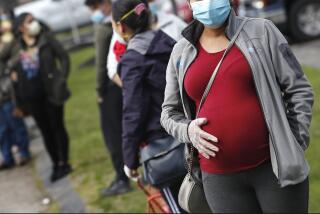Fevers during pregnancy linked to autism, but medication helps
- Share via
Women who reported having had a fever during pregnancy were more likely to give birth to a baby who would later be diagnosed with autism spectrum disorder or a development delay, says a major new study. But the babies of women who treated their fevers with medication fared no worse than babies whose mothers recalled having suffered no fevers at all.
The findings, wrote the authors, “suggest that anti-fever medication used to control fever during pregnancy can reduce or eliminate” the apparent link between maternal fever and autism.
The study, by researchers at UC Davis’ MIND Institute, was published in the Journal of Autism and Developmental Disorders. It wades into a tempestuous debate over what environmental factors in pregnancy might contribute to autism -- and to an apparent increase in autism over the last several decades. Several studies have yielded conflicting findings over whether a link exists between infections during pregnancy and a baby’s risk for autism. Many of those studies, however, have been marred by small population sizes and their reliance on a mother’s recall, or medical records, of infection.
The current study, called Childhood Autism Risks from Genetics and Environment (CHARGE), sought to avoid those pitfalls. Researchers enrolled babies and their mothers into the major population study when the infants were between the ages of 2 and 5. Between January 2003 and September 2010, 1,122 babies were enrolled--538 diagnosed with autism spectrum disorder, 163 with developmental delays that were not thought to be autism, and 421 typically developing children. Their mothers were interviewed at length about their pregnancies; whether they were vaccinated against flu; whether and when in their pregnancies they suffered infection, flu, or fevers; and what medication, if any, they took in response.
Researchers found no link between a woman’s report of having had influenza--or a flu vaccine shot--during pregnancy, and the baby that would go on to have autism or developmental delay. But asking about fevers--the body’s immune response to a wide range of infections, including influenza--yielded a different response.
All told, 191 of the participating mothers reported that they had suffered a fever in the course of pregnancy. Of those, 76 said they treated themselves with medication designed to lower fever--products containing acetaminophen or ibuprofen. But 115 did not take any such medication, or reported they took medication that would not have acted to lower fever.
Compared with babies whose mothers reported no fevers during pregnancy, the babies of mothers who had fevers were about 2 1/2 times more likely to be diagnosed later with a communications disorder on the autism spectrum, and 2 3/4 times more likely to have developmental delays.
Medication to drive down elevated body temperature helped avoid developmental delays by a little: When a pregnant woman took fever medication, her baby’s odds of having a developmental delay went down to twice the probability of a mother-baby pair that experienced no fevers.
But medication to drive down fever appeared to markedly drive down the odds that a baby would go on to be diagnosed with autism spectrum disorder. The babies of these women were only about 30% more likely to develop autism.
The results, suggest the authors, parallel findings in pregnant rats and mice--that when an animal’s massive inflammatory response to an infection is suppressed, the development of behavioral abnormalities in the resulting offspring is reduced.





